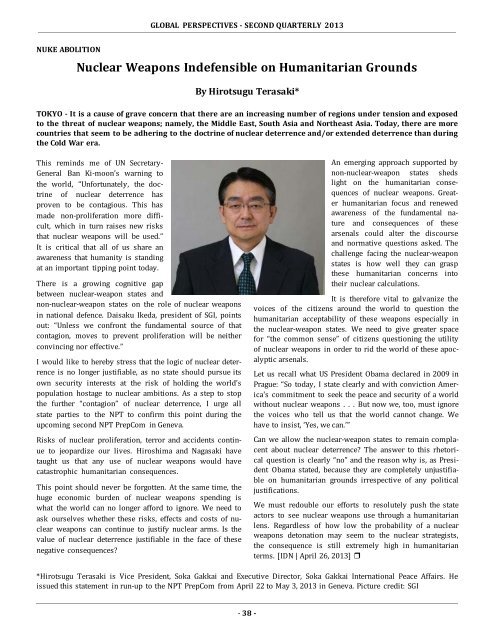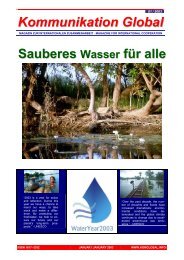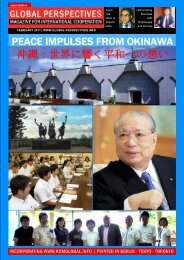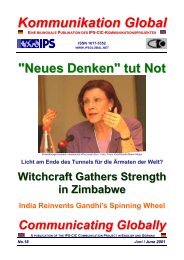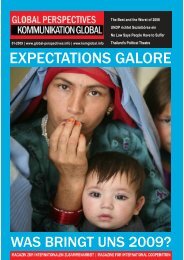GLOBAL PERSPECTIVES | Second Quarterly 2013 â North America ...
GLOBAL PERSPECTIVES | Second Quarterly 2013 â North America ...
GLOBAL PERSPECTIVES | Second Quarterly 2013 â North America ...
You also want an ePaper? Increase the reach of your titles
YUMPU automatically turns print PDFs into web optimized ePapers that Google loves.
<strong>GLOBAL</strong> <strong>PERSPECTIVES</strong> - SECOND QUARTERLY <strong>2013</strong><br />
NUKE ABOLITION<br />
Nuclear Weapons Indefensible on Humanitarian Grounds<br />
By Hirotsugu Terasaki*<br />
TOKYO - It is a cause of grave concern that there are an increasing number of regions under tension and exposed<br />
to the threat of nuclear weapons; namely, the Middle East, South Asia and <strong>North</strong>east Asia. Today, there are more<br />
countries that seem to be adhering to the doctrine of nuclear deterrence and/or extended deterrence than during<br />
the Cold War era.<br />
This reminds me of UN Secretary-<br />
General Ban Ki-moon’s warning to<br />
the world, “Unfortunately, the doctrine<br />
of nuclear deterrence has<br />
proven to be contagious. This has<br />
made non-proliferation more difficult,<br />
which in turn raises new risks<br />
that nuclear weapons will be used.”<br />
It is critical that all of us share an<br />
awareness that humanity is standing<br />
at an important tipping point today.<br />
There is a growing cognitive gap<br />
between nuclear-weapon states and<br />
non-nuclear-weapon states on the role of nuclear weapons<br />
in national defence. Daisaku Ikeda, president of SGI, points<br />
out: “Unless we confront the fundamental source of that<br />
contagion, moves to prevent proliferation will be neither<br />
convincing nor effective.”<br />
I would like to hereby stress that the logic of nuclear deterrence<br />
is no longer justifiable, as no state should pursue its<br />
own security interests at the risk of holding the world’s<br />
population hostage to nuclear ambitions. As a step to stop<br />
the further “contagion” of nuclear deterrence, I urge all<br />
state parties to the NPT to confirm this point during the<br />
upcoming second NPT PrepCom in Geneva.<br />
Risks of nuclear proliferation, terror and accidents continue<br />
to jeopardize our lives. Hiroshima and Nagasaki have<br />
taught us that any use of nuclear weapons would have<br />
catastrophic humanitarian consequences.<br />
This point should never be forgotten. At the same time, the<br />
huge economic burden of nuclear weapons spending is<br />
what the world can no longer afford to ignore. We need to<br />
ask ourselves whether these risks, effects and costs of nuclear<br />
weapons can continue to justify nuclear arms. Is the<br />
value of nuclear deterrence justifiable in the face of these<br />
negative consequences?<br />
An emerging approach supported by<br />
non-nuclear-weapon states sheds<br />
light on the humanitarian consequences<br />
of nuclear weapons. Greater<br />
humanitarian focus and renewed<br />
awareness of the fundamental nature<br />
and consequences of these<br />
arsenals could alter the discourse<br />
and normative questions asked. The<br />
challenge facing the nuclear-weapon<br />
states is how well they can grasp<br />
these humanitarian concerns into<br />
their nuclear calculations.<br />
It is therefore vital to galvanize the<br />
voices of the citizens around the world to question the<br />
humanitarian acceptability of these weapons especially in<br />
the nuclear-weapon states. We need to give greater space<br />
for “the common sense” of citizens questioning the utility<br />
of nuclear weapons in order to rid the world of these apocalyptic<br />
arsenals.<br />
Let us recall what US President Obama declared in 2009 in<br />
Prague: “So today, I state clearly and with conviction <strong>America</strong>'s<br />
commitment to seek the peace and security of a world<br />
without nuclear weapons . . . But now we, too, must ignore<br />
the voices who tell us that the world cannot change. We<br />
have to insist, ‘Yes, we can.’”<br />
Can we allow the nuclear-weapon states to remain complacent<br />
about nuclear deterrence? The answer to this rhetorical<br />
question is clearly “no” and the reason why is, as President<br />
Obama stated, because they are completely unjustifiable<br />
on humanitarian grounds irrespective of any political<br />
justifications.<br />
We must redouble our efforts to resolutely push the state<br />
actors to see nuclear weapons use through a humanitarian<br />
lens. Regardless of how low the probability of a nuclear<br />
weapons detonation may seem to the nuclear strategists,<br />
the consequence is still extremely high in humanitarian<br />
terms. [IDN | April 26, <strong>2013</strong>] <br />
*Hirotsugu Terasaki is Vice President, Soka Gakkai and Executive Director, Soka Gakkai International Peace Affairs. He<br />
issued this statement in run-up to the NPT PrepCom from April 22 to May 3, <strong>2013</strong> in Geneva. Picture credit: SGI<br />
- 38 -


